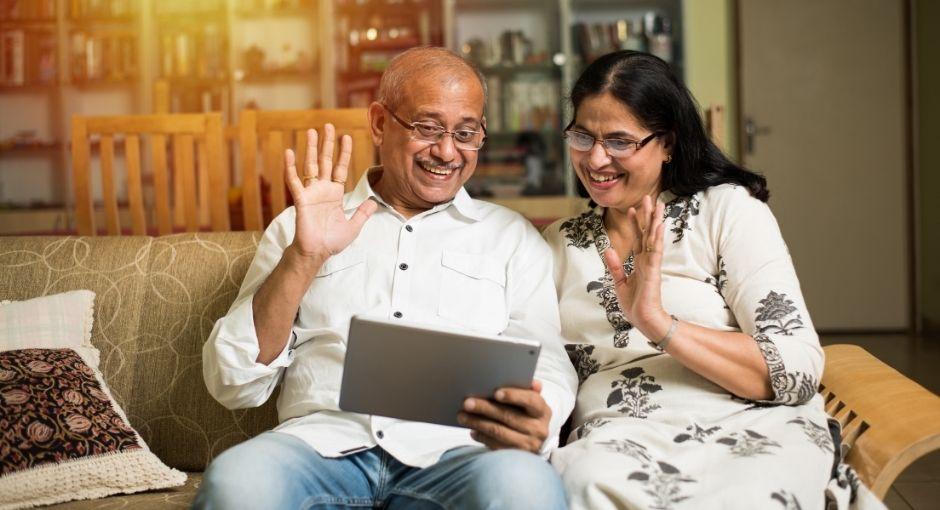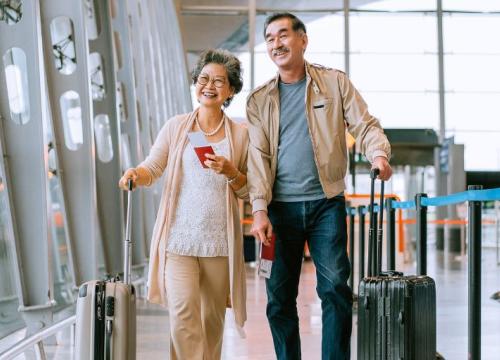Top Questions and Answers on COVID-19 and Parkinson's Disease

Since the coronavirus (COVID-19) pandemic is currently part of our daily lives, the Parkinson’s Foundation is addressing the top questions about the virus and Parkinson’s disease (PD). On March 18, 2020 Michael S. Okun, MD, Parkinson’s Foundation Medical Advisor, and Fred Southwick, MD, Infectious Disease Expert and Author, both from the University of Florida Health, a Parkinson’s Foundation Center of Excellence, answered the top COVID-19 questions from our community. View the event recording now. Of course, our Helpline Specialists, 1-800-4PD-INFO, are here to assist you with any other questions that are not covered here.
FAQ on COVID-19 and PD:
Expert COVID-19 Prevention Advice for people with Parkinson’s:
- Wash your hands for 20 seconds frequently. Sing happy birthday twice while washing.
- Socially distance: stay home, limit visitors and cancel all group gatherings.
- Know that all people with Parkinson’s are at higher risk.
- Minimize cabin fever anxiety. Call or Facetime family and friends often.
- Reschedule all non-urgent doctors and dentist appointments. If deemed necessary, ask if it can be performed over the phone or telemedicine.
- If you get sick call your doctor’s office before going so they can be ready to protect you and others.
- If you are considering bringing a loved one home from a nursing home, talk to the healthcare team first.
- Avoid flights and travel.
- If you have Parkinson’s, get the pneumonia vaccine and flu shot.
1. Are people with Parkinson’s more at risk of developing COVID-19?
Those living with Parkinson’s disease are in a “high risk group,” this includes all ages. We are learning that COVID-19 tends to be more severe in the elderly and those with chronic diseases. Currently, there is no evidence that a PD diagnosis makes you more vulnerable to contracting illness. The best advice for those with PD is prevention.
2. Do people with PD have a compromised immune system?
In short, those with PD have an intact immune system that functions well. We believe that in general the Parkinson’s disease immune system functions at a high level and is similar to the immune system in those without Parkinson’s.
3. Should I get the pneumonia vaccine?
Yes, regularly get pneumonia vaccinations if you have Parkinson’s.
4. Are people with PD more prone to lung issues?
Yes, people with PD are more prone to pneumonias and infections. Respiratory issues can make it difficult to take deep breaths, getting enough oxygen into the lungs. These potential issues are a reason those with PD are considered a high-risk group.
5. Should I get the flu vaccine?
Yes, every person with Parkinson’s should get the flu shot.
6. Are over-the-counter cold and flu medications safe to use with levodopa-carbidopa? For example, Mucinex Fast-Max has a caution about MAOI drug interactions.
Over the counter medications are safe in general, but a few things to watch out for include MAO-B inhibitors (selegiline, rasagiline, Xadago, others) should not be mixed with dextromethorphan which is common in many cough syrups. Also, if you have high blood pressure avoid drugs with pseudoephedrine. Read our blog article on the topic.
7. Should I keep going to my scheduled doctor’s appointments?
Call your doctor’s office and ask if it is necessary to come in person for a visit. In many cases medication refills and adjustments can be performed over the phone or by telemedicine. If it is recommended you attend in person, wash your hands, call ahead and avoid crowded waiting areas.
8. Should I prepare for my doctor’s appointments being cancelled?
Yes, prepare for your routine doctor’s appointments to be cancelled and try to set up a phone or telemedicine follow-up.
9. When my mother goes to the hospital for other issues related to her Parkinson’s they usually keep her overnight for observation. If her symptoms are not severe or lasting 24 hours, should she stay home?
In general, try to avoid hospitalizations or clinic appointments if possible. In emergencies call the doctor’s office or emergency room and let them know you are coming, so preparations can be made for your arrival. Try to avoid crowded waiting rooms.
10. My Parkinson’s affects my blood pressure. How might COVID-19 affect me?
In general Parkinson’s disease and Parkinson’s medications both lower blood pressure. Watch out for “passing out” or dizziness when changing position (e.g. standing). Hydration, compression stockings, abdominal binders, and in some cases medications may be helpful. If the problem is blood pressure that is too high, then a conference between your Parkinson’s doctor and the internist would be the next step. Sometimes it is supine hypertension and the head of the bed needs to be elevated. Sometimes it is simply wearing off of the Parkinson's medications. It is important to establish cause before treatment is initiated.
11. Should I travel? Should I fly?
No. We do not recommend that people with Parkinson’s fly at this time. We recommend staying home and socially distancing.
12. If my state has a low incidence is it safe to travel within it?
No, do not travel.
13. Should I stay home? Should I go to group exercise classes and support groups?
Stay home, temporarily suspend going to in-person group exercise classes and support groups. We recommend safe exercise and support through resources on the internet such as the Parkinson’s Foundation YouTube channel and PD Conversations.
14. Rehabilitation facility and nursing home questions:
- Is it safer to keep my loved one in a nursing home or bring her/him home?
You should do everything you can to try to safely keep your loved one in the facility with the around-the-clock care and resources. Telephone calls and video-chatting may be useful. In rare cases, some families may have the resources and support to bring a patient home, however, remember this virus pandemic could last several months. Don’t be so quick to remove your loved one from a nursing home or facility. Talk to your doctor and medical team first. If you decide to make the move, make sure you have the right gear, medication and support.
- Where is my loved one most likely to get better care and access to treatment if they develop symptoms (at a nursing home or if I take them to the hospital)?
It is best to employ the screening recommended for COVID-19 by the CDC. Each nursing facility has a doctor and if the screening tests at the bedside suggest it, a COVID-19 a protocol will be activated, and the doctor will arrange isolation and appropriate next steps for potential transfer and formal testing.
- What should I do if my loved one is quarantined in a nursing home and I am not allowed to visit?
This is a tough situation and we recommend regular phone calls and video chats.
- My husband is in a nursing home and has dementia. He becomes delusional and hallucinates when he doesn’t see me regularly. How can I address the “side effects” of social isolation if I can’t visit?
First, our hearts go out to you and your family. A few strategies we have recommended include regular telephone calls, use of telemedicine and in exceptional situations sometimes moving back home, if support is available. This would apply only to families who have the right supplies and support to keep their loved one safe for several months.
- I live in a nursing home. Should I try to temporarily stay with a relative?
If it is possible and resources are available to completely support you for several months, this is worth consideration and should be discussed with your doctor.
- What can I do if I or my loved one is in a nursing home and plans to stay?
Nursing homes must follow strict CDC guidelines. It does not hurt to ask those in charge if they’re following these guidelines. Sometimes, the best thing you can do is to play a role in reminding the people who are taking care of you to follow protocol, like washing their hands. Try to stay clean and socially isolate, staying six feet away from others, when possible. Get on Facetime and call friends and family as often as possible.
15. Is there anything I can do to prevent getting COVID-19?
Regular handwashing, social distancing, avoid crowds and stay home. In your home, limit visitors and ideally take in no outside visitors.
16. Any advice for avoiding social isolation anxiety?
When you socially isolate it can be easy to become distant. Get on Facetime, especially with loved ones in nursing homes/facilities, but also reach out to friends and family. We want people to know they’re cared for, talk on the phone as much as you can. Decrease the anxiety around cabin fever. Reach out. The power of social interaction is powerful to calm people down.
17. Should I get dental work done?
Any elective procedures such as dental cleanings or procedures should be delayed, if possible.
18. Should I avoid taking ibuprofen if I think I might have COVID-19?
There are many false stories on ibuprofen and COVID-19 circulating. Currently there is no evidence to support a worsening of COVID-19 with ibuprofen use. We will continue to monitor the situation, but in general we are trying to reassure patients that ibuprofen and other medications recommended by your doctor are safe. If you have concerns, consider Tylenol or another alternative.
If you have questions about Parkinson’s contact our free bilingual Helpline at
1-800-4PD-INFO (1-800-473-4636) or Helpline@Parkinson.org.
Related Blog Posts

20 Parkinson’s-Friendly Gifts

8 Tips for Traveling with Parkinson’s
